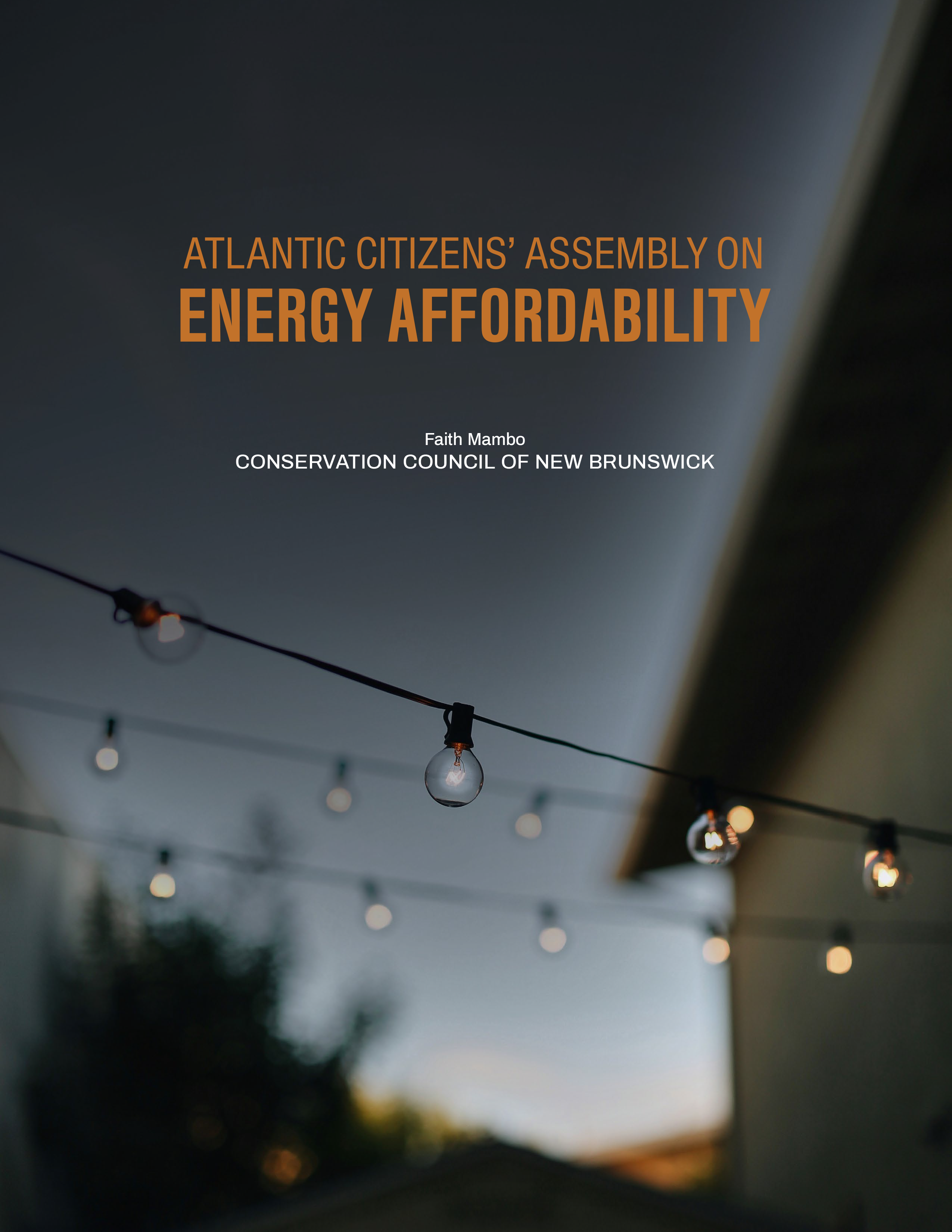The Atlantic Citizens'
Declaration on Electricity Affordability
Atlantic Citizens' are leading the way in creating a fair and sustainable energy system. Join the movement by signing on to the petition today!
Atlantic Canadians are speaking up about energy affordability!
Rising energy costs are affecting everyone in our region. In May 2024, the Conservation Council of New Brunswick brought together everyday people from across Atlantic Canada to tackle energy affordability head-on. This Atlantic Citizens’ Assembly on Energy Affordability tasked residents with figuring out real solutions to lower energy costs, improve energy efficiency and make life more affordable for families.
The resulting Declaration on Electricity Affordability created by these residents lays out clear steps for a fair, transparent energy system that benefits everyone.
Add your name to the declaration and help us create a future where all Atlantic Canadians can afford the energy they need.
Add your name in support of their recommendations on Electricity Affordability
Download the complete declaration (PDF) or browse through our declaration below:
DECLARATION
Atlantic Citizens' Assembly on
Electricity Affordability
WHEREAS affordable electricity is essential to our quality of life, health and safety, and is a necessity of modern society.

Principles and Goals
WE BELIEVE the following principles and goals should guide government decision-making about regional electricity systems and the operation of utilities across the Atlantic provinces:
1. Accessibility and Affordability: Electricity, as an essential service, should be exempt from taxes, similar to basic groceries, and universally accessible and affordable for all. This is especially important for vulnerable groups, including low-to-moderate-income households, seniors and those with special needs.
2. Transparency and Accountability: Promote transparency and honesty in utility operations by mandating the disclosure of real-time cost and resource data. Utilities should manage costs effectively before proposing rate increases and demonstrate accountability through regular and accessible reporting on key performance indicators.
3. Progressive Policy Changes: Commit to progressive policy changes, considering the social effects that policies have on Atlantic Canadians and avoiding stagnation in policy development.
4. Equitable Outcomes: Ensure fair and balanced treatment for all ratepayers, with industries paying their fair share. Focus on reducing domestic rates rather than exporting energy for profit, and ensure revenues from rates support technologies that enhance energy efficiency.
5. Community Engagement: Engage directly and frequently with ratepayers to assess the real-time impacts of decisions, using updated information to guide decision-making processes. This includes consulting with local and Indigenous communities in the development of energy projects.
6. Energy Literacy: Increase energy literacy across Atlantic provinces with focused education on energy management and cost-saving measures.

Policies
WE BELIEVE that federal and provincial electricity strategies should be based on the following policies:
1. Funding and Support for Energy Transition: Explore innovative funding options like electricity bonds to finance the transition to a sustainable energy system and ensure that the financial burden of the net-zero transition does not fall disproportionately on Canadians.
2. Long-term Planning and Energy Efficiency: Ensure that utilities plan for the long term, prioritizing domestic rate reductions and using revenue from rates to advance technologies that improve energy efficiency for further cost savings to ratepayers.
3. Sustainable and Decentralized Energy Options: Support the inclusion of cooperative, community-owned and Indigenous-owned energy projects. Promote low-carbon and sustainable energy generation and incorporate a mix of distributed energy sources and microgrids.
4. Renewable and Clean Energy Commitment: Commit to expanding renewable and non-polluting energy sources.
5. System Integration: Create an integrated electricity system that enhances regional, national and international reliability, supporting renewable and non-polluting energy sources. Increase government cooperation to enhance renewable energy and transmission infrastructure.
6. Institutional Strengthening: Strengthen institutions like energy and utility boards for better accountability and transparency.
7. Incentive Reform and Efficiency: Reform incentives, such as net metering and taxation policies, to encourage energy efficiency from generation to consumption.
8. Worker Transition Support: Provide necessary training and support for workers transitioning to roles within the clean electricity system.
9. Work-From-Home Initiatives: Support work-from-home policies and reintroduce programs similar to COVID rebates to facilitate remote work without financial penalties to employees.
10. Annual Policy Review: Regularly review and revise energy policies and programs based on citizen’ social and the economic needs and ensure industries contribute their fair share through a tiered system that considers the scale of business operations.

Programs
WE BELIEVE the following programs should be included in Atlantic Canada:
1. Interest-Free Loans and Grants: Establish a program that offers interest-free loans and/or grants for energy-efficient home improvements to help homeowners manage upfront costs.
2. Free Energy Audits: Require and offer government-funded residential energy audits to promote continuous energy efficiency improvements, providing homeowners with free audits to identify opportunities for energy-saving upgrades and personalized recommendations.
3. Energy Efficiency Programs: Increase eligibility and funding for energy efficiency programs, targeting improvements in residential and rental properties.
4. Expanding Energy Efficiency Programs: Expand and enhance electric vehicle, hybrid and EV charger rebates, including rebates for micro-electric vehicles like electric bikes and trikes.
5. Create Efficiency Incentives for Landlords: Increase support for landlords to make timely energy-efficient upgrades without raising rents and enhance tenant rights to request such upgrades. Implement mandatory energy efficiency standards in rental properties and provide tax incentives or rebates for energy-efficient products and renewable energy investments.
6. Bulk-Buy Solar Panel Programs: Implement and expand bulk-buy solar panel programs to allow not only communities but also entire provinces to purchase solar panels collectively, akin to how provinces procure electric school buses.
7. Competitive Buyback Program: Establish a competitive buyback program for households to sell excess energy back to the grid.
8. Public Transit and Ride Share Expansion: Invest in and expand public transit infrastructure and services, such as bus routes, shuttle services, park-and-ride facilities and electric buses, to reduce reliance on personal vehicles and enhance transportation-related energy efficiency. Additionally, incentives for ride-share and car-share programs should be added, with a focus on increasing accessibility in rural areas that have limited public transportation options, including the expansion of EV ride-share programs.
9. Community Support Initiatives: Help form community support groups focused on energy efficiency and renewable energy, providing resources, information and networking opportunities.
10. Sustainable Appliance Programs: Develop initiatives to replace inefficient appliances and encourage the donation or trade of old ones.
11. Energy Assistance Programs for Vulnerable Populations: Develop targeted energy assistance programs for low-income individuals, newcomers, single-family homeowners, seniors and people with disabilities, particularly addressing the needs of those in regions without air conditioning.
12. Older Home Retrofitting: Introduce a retrofit program for older homes to incorporate energy-efficient features, first assisting those most vulnerable based on health requirements and subsequently on financial need.




